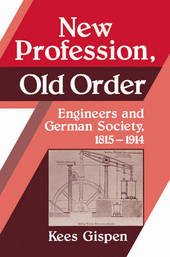
|
New Profession, Old Order: Engineers and German Society, 1815-1914
Paperback / softback
Main Details
| Title |
New Profession, Old Order: Engineers and German Society, 1815-1914
|
| Authors and Contributors |
By (author) Kees Gispen
|
| Physical Properties |
| Format:Paperback / softback | | Pages:368 | | Dimensions(mm): Height 230,Width 154 |
|
| Category/Genre | World history - c 1750 to c 1900
History of science
Engineering - general |
|---|
| ISBN/Barcode |
9780521526036
|
| Classifications | Dewey:303.483 |
|---|
| Audience | | Professional & Vocational | |
|---|
| Illustrations |
Worked examples or Exercises
|
|
Publishing Details |
| Publisher |
Cambridge University Press
|
| Imprint |
Cambridge University Press
|
| Publication Date |
25 July 2002 |
| Publication Country |
United Kingdom
|
Description
New Profession, Old Order is an exploration of the creative tension between modern technology and preindustrial Germany. It concentrates on the social and educational history of engineers as a microcosm of the larger society between 1815 and 1914, and asks why this new occupation, so successful in transforming the physical world, did not achieve the professional power, cohesion and prestige that its technological accomplishments would seem to have warranted. The author proposes answers that center on the historical situation in which the engineering profession found itself. He develops his thesis through careful consideration of the strategies, organization, and development of technical education in nineteenth-century Prussia, the educational struggles and political debates of German engineers and their various associations, changing career prospects, and the relations between engineering management, salaried employees, professionalizers, and government. The result is a study that demonstrates the seamless links between Germany's long-term socioeconomic modernization and its temporary political traumatization.
Reviews"Kees Gispen's splendid book, the first full-length study in English of the subject, challenges historical cliches from the very beginning...Gispen's sensitive analysis draws fruitfully upon the Anglo-American literature on professionalisation...The value of Gispen's comprehensive analysis as an antidote to tendentious judgements--whether made by over-enthusiastic contemporaries in Britain or by historians--on the prestige of 19th century German engineering will be obvious. There are lessons, too, for those not principally concerned with such a distant past. Historians of the Nazi era will in particular find substantial hints for their own work...It seems destined to become both the standard work in its particular field and, in the sensibility and breadth of its analysis, an inspiration for all those studying the professionalisation of engineers, whichever country forms the primary focus of their interest." Colin Divall, Science and Public Policy "In this sensitive study, Kees Gispen looks at engineering from the least theoretical and broadest based of its sectors--the mechanical and civil practioners...It is the story of a desire on the part of parvenus to enter high-class drawing rooms...Gispen leads us across a rich tapestry of proclamations and pressure tactics, providing the most nuanced treatment to date of the aspirations of rank-and-file engineers in late nineteenth-century and early twentieth-century Germany...New Profession, Old Order contains bright flashes of insight. Gispen suggests, for example, that 'the protracted heterogeneity and absence of a clearly dominant, single type of German engineer and the existence of all sorts of technical schools and avenues into engineering probably were optimal conditions for rapid technological progress.' For its verve and its vision, Gispen's argument deserves close attention by historians of education." Lewis Pyenson, History of Education Quarterly "Gispen's history of the German engineering profession is a richly detailed portrait of the dialectic between class fractions and status groups inside engineering, and how these social forces clashed and shaped the structure of the 'profession' in Germany up to 1914...Gispen's account of German engineers holds up a model for other histories of professional associations and a major challenge to writers who ignore or underestimate the importance of class politics for shaping divided occupational 'communities'." Chris Smith, Work, Employment and Society "...what is astonishing, and chilling, is how often it is a tract for our own times, spotlighting the difficulties that the British still encounter with the education, work and status of engineers...Gispen's book shows that the question of whether an engineer could ever be a gentleman was as eloquently fought out in Germany as it was (is?) in Britain...Anyone with any knowledge of the astonishing neglect of engineering education in Britain will find many chapters of this book almost unbelievable." New Scientist "Kees Gispen's book is an ambitious study of German engineers before 1914...Gispen does not eschew use of theory for a strictly empirical approach. While the study is solidly researched--based primarily on rare engineering journals and numerous business archives--it is also guided by recent sociological models. Gispen has performed yeoman's service with his sociopolitical analysis of a significant profession. Moreover, he reveals the historical origins of the pro-Nazi sympathies of many of its members...an extremely impressive exposition." Eric Dorn Brose, AHR "For English-speaking readers, this work will form an introduction, not only to the history of a profession, but also to the subtleties of social stratification in a society still dominated by the landed classes and a privileged bureaucracy, while in process of breathtakingly rapid economic change...this is an excellent scholarly contribution to the understanding of the strains and stresses to which German society was subjected in the decades before World war I." Sidney Pollard, Business History "Studies of professionalization tend to be success-oriented accounts of the rise of expert groups to social dominance. Gispen's analyses of engineering provides a refreshing contrast in tackling what amounted to a failed profession...Gispen shows that engineers remained fragmented with various competing groupings...He does provide a finely crafted and intellectually sophisticated analysis of professionalization in a distinctive political context, and opens challenging new perspectives for historians interested in education and the social repercussions of German industrialization." Paul Weindling, German History
|